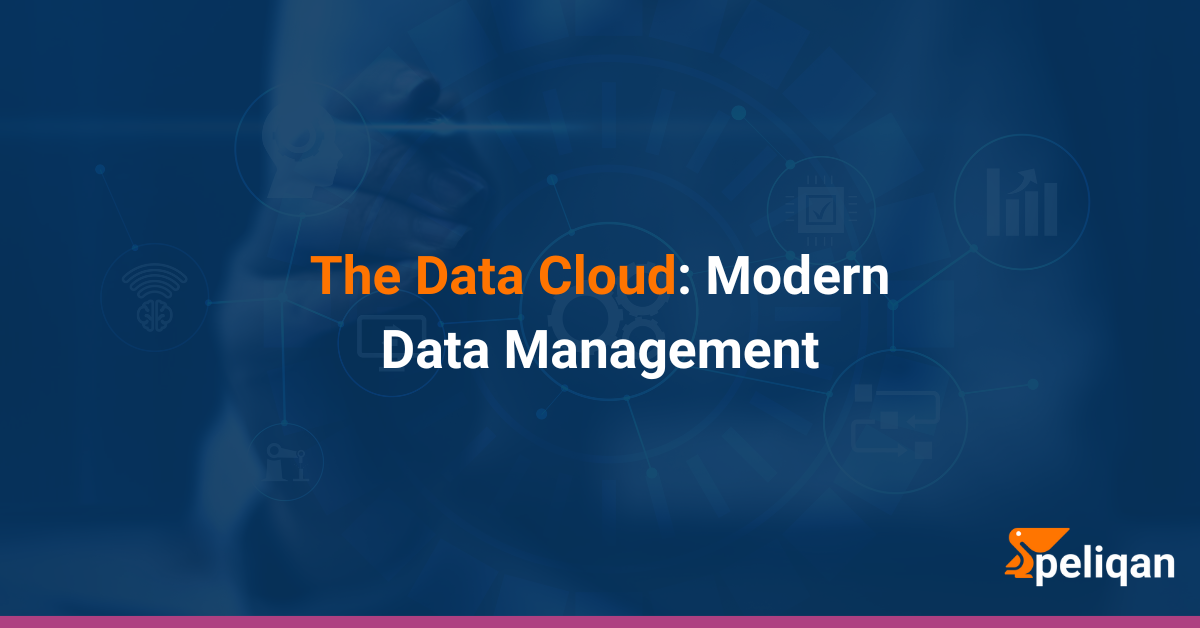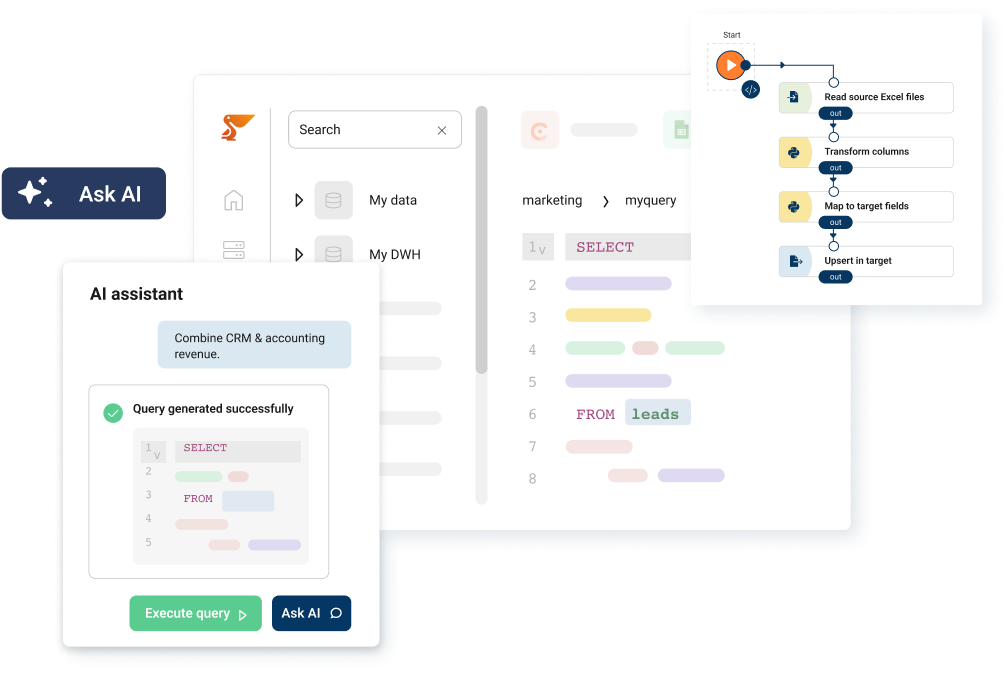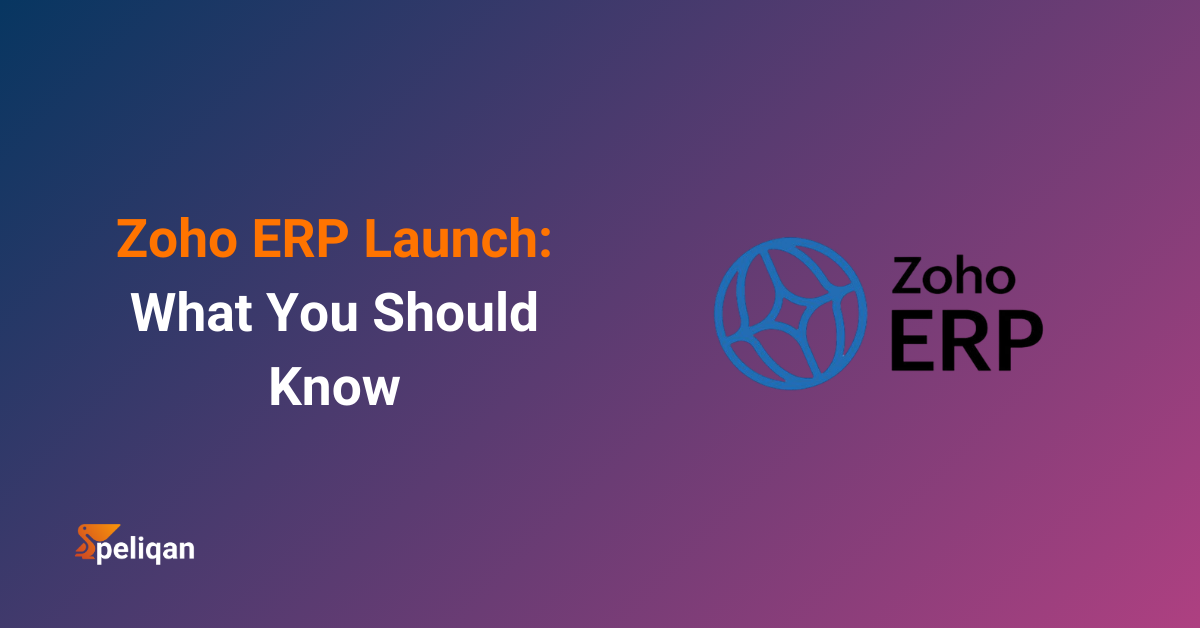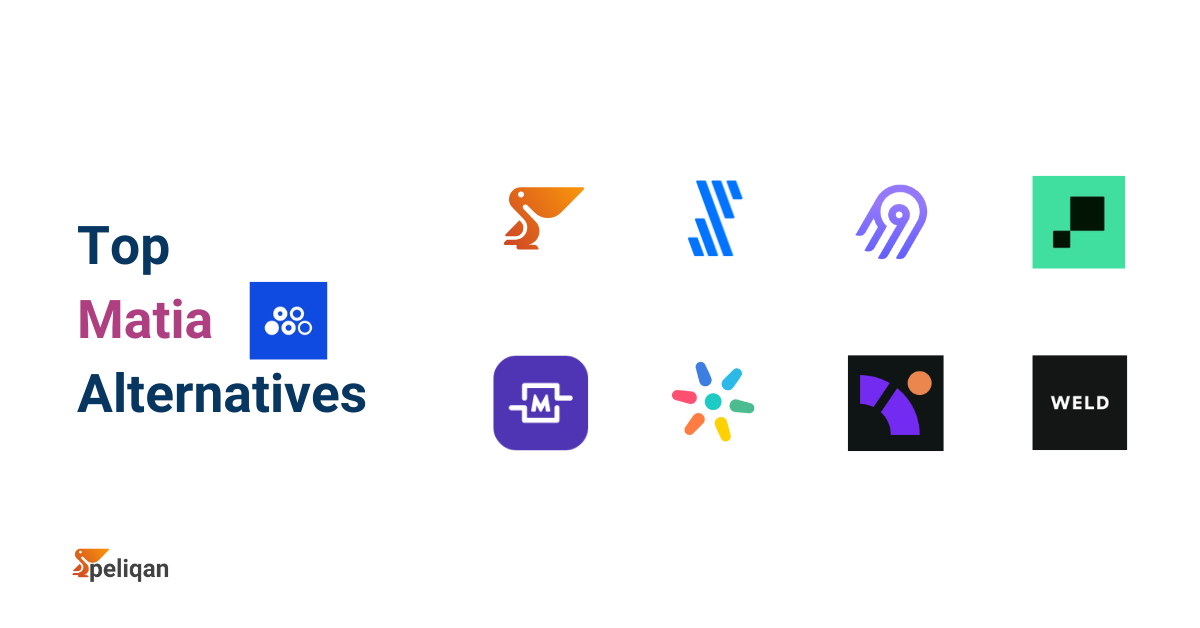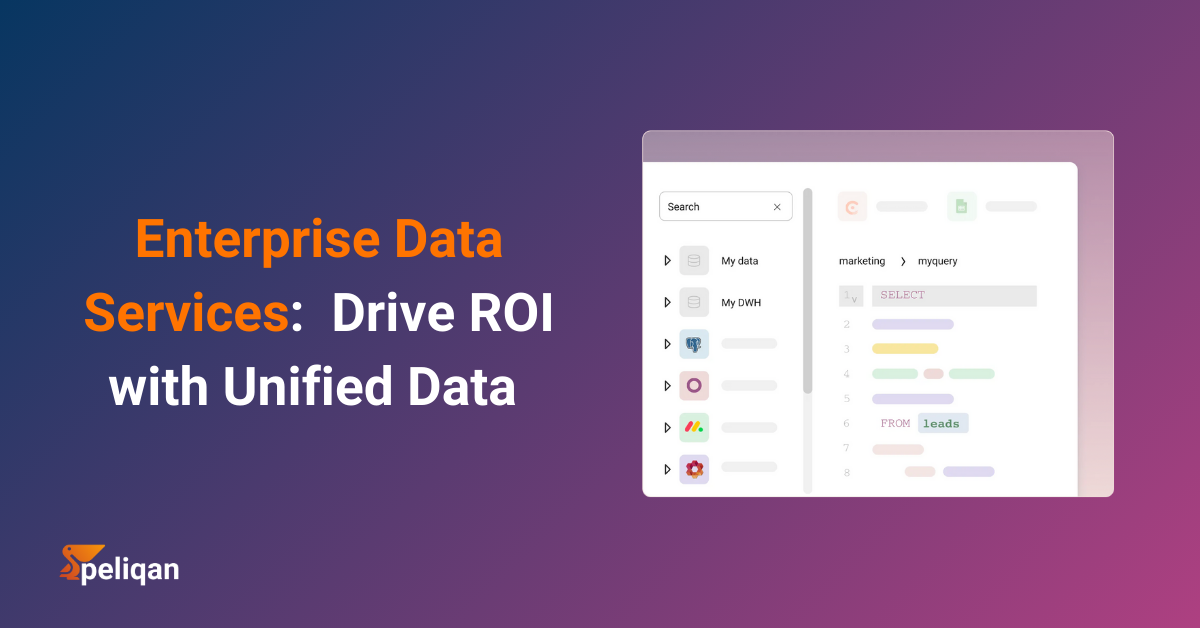Data has emerged as a critical asset that drives decision-making, innovation, and competitive advantage. However, managing vast amounts of data from diverse sources presents significant challenges for organizations. Traditional data management methods often fall short, leading to fragmented workflows, data silos, and limited accessibility. This is where the concept of the data cloud comes into play.
By leveraging a data cloud, businesses can break down data silos, ensure data accuracy, and gain deeper insights that drive strategic initiatives and operational efficiencies. In this comprehensive guide, we will explore the history of data clouds, how they work, the essential capabilities they must possess, and their impact on various industries.
We will also delve into how enterprises are solving critical problems with data clouds and what the future holds for this transformative technology. By understanding the full potential of data clouds, organizations can make informed decisions to harness the power of their data, streamline operations, and achieve long-term success.
What is a Data Cloud?
A data cloud is a centralized, cloud-based data management system that unifies an organization’s data from various sources. It serves as a single repository, ingesting data from databases, applications, social media, and even Internet of Things (IoT) devices. Regardless of the data format (structured, semi-structured, or unstructured), a data cloud securely stores, processes, analyzes, and visualizes the information within a single platform.
Why Businesses Need a Data Cloud
Cloud based data storage empowers businesses to overcome these limitations and unlock the full potential of their data. Here’s how:
- Break Down Data Silos and Ensure Data Accuracy: A data cloud centralizes all your data, eliminating inconsistencies and discrepancies. Everyone in your organization has access to the same accurate and up-to-date information, fostering better collaboration and decision-making.
- Gain a Competitive Edge Through Data-Driven Decisions: With a data cloud, you can gain deeper insights into customer behavior, market trends, and operational efficiency. This empowers you to make data-driven decisions that optimize your processes, personalize customer experiences, and stay ahead of the competition.
- Improved Data Processing, Analysis, and Visualization: Data clouds offer powerful tools and functionalities for data processing, analysis, and visualization. You can clean, transform, and prepare your data for analysis, and leverage advanced analytics tools like machine learning to uncover hidden patterns and predict future trends. Interactive data visualizations allow you to translate complex data into clear, actionable insights.
The need for a data cloud is underscored by a recent study conducted by Harvard Business Review, 63% of chief executives don’t believe their companies make good use of their analytics. This highlights the critical role a data cloud plays in bridging the gap between raw data and actionable insights.
History of Data Cloud
The evolution of data cloud technology has transformed how businesses manage and leverage data. Understanding its history helps appreciate the innovations and advancements shaping the current landscape.
Early Beginnings: Centralized Data Management
In the early days of computing, data management was primarily centralized within mainframe systems. These large, powerful computers stored and processed data for entire organizations. However, the limitations of mainframe systems, such as high costs and lack of flexibility, led to the development of more distributed approaches.
The Rise of On-Premises Data Warehousing
In the 1980s and 1990s, on-premises data warehousing became popular. Companies invested in hardware and software to create centralized repositories for their data. These data warehouses allowed for better data integration and analysis but required significant upfront investment and ongoing maintenance.
The Advent of Cloud Computing
The early 2000s saw the rise of cloud computing, which revolutionized data storage and management. Cloud service providers like Amazon Web Services (AWS), Google Cloud, and Microsoft Azure offered scalable, cost-effective solutions for storing and processing data. This shift enabled organizations to move away from expensive on-premises infrastructure to more flexible, pay-as-you-go models.
Emergence of Data Clouds
Building on the foundation of cloud computing, data clouds emerged as comprehensive solutions for managing vast amounts of data from diverse sources. Data clouds combined the scalability of cloud infrastructure with advanced data processing, integration, and analytics capabilities. Companies like Snowflake, Google BigQuery, and Amazon Redshift led the way, providing platforms specifically designed for modern data needs.
Current Landscape and Innovations
Today, data clouds are essential for organizations seeking to harness the power of their data. Innovations in artificial intelligence (AI), machine learning (ML), and real-time data processing are further enhancing the capabilities of data clouds. Platforms like Peliqan Data Cloud are pushing the boundaries by offering all-in-one solutions that simplify data management and unlock valuable insights.
How Does Data Cloud Work?
A data cloud operates by integrating data storage, processing, and analytics within a unified cloud environment. Below is a breakdown of its components and process:
| Component | Description |
|---|---|
| Data Ingestion | Aggregates data from various sources like apps, IoT devices, and databases for processing. Ensures raw data is securely collected and ready for use. |
| Data Storage | Holds structured, semi-structured, and unstructured data in scalable, cloud-based warehouses. Supports high-performance and secure storage. |
| Data Integration | Unifies diverse data formats into a cohesive structure for streamlined analysis. Bridges gaps between disconnected data sources. |
| Data Processing | Handles large-scale data computations in real-time or batch operations. Employs distributed systems for efficiency and speed. |
| Data Analytics | Enables advanced querying, reporting, and AI-driven insights. Provides tools to visualize and interpret data trends effectively. |
| Data Sharing | Facilitates secure data exchange between teams and organizations. Encourages collaboration while maintaining governance. |
Data Cloud Use Cases: Different Industries
Enterprises across various industries are leveraging data clouds to solve critical business challenges and drive innovation. Here are some real-world examples:
1. Logistics and Supply Chain Management
Data clouds help logistics companies streamline operations and optimize supply chains. For example, Heylog uses Peliqan Data Cloud to integrate data from TMS systems and capture live transport location information. This integration enhances visibility and improves communication across the supply chain.
2. Real Estate and Property Management
In the real estate sector, data clouds enable better project management and customer communication. Ziggu uses Peliqan to capture and analyze sales and customer data, facilitating informed decision-making and improving customer-centric approaches.
3. Finance and Accounting
Financial institutions rely on data clouds for improved reporting and compliance. Horsum uses Peliqan as a central data hub for accounting software connectivity, enabling automated reporting and enhanced financial visibility.
4. Hospitality and Tourism
Data clouds transform data management in the hospitality industry. CIC Hotels leverages Peliqan to consolidate data from different hotel management systems, streamlining monthly board reports and ensuring accurate, timely information.
5. Healthcare and Wellness
Data clouds support personalized care and innovation in healthcare. Skindr uses Peliqan to centralize marketing and app download data, providing valuable insights into customer acquisition and lifetime value.
Must-Have Capabilities of the Data Cloud
To fully harness the power of their data, organizations need data clouds with the following essential capabilities:
| Capability | Description | Features |
|---|---|---|
| Seamless Data Ingestion | A robust data cloud should offer seamless data ingestion from diverse sources, including databases, applications, social media, and IoT devices. | Pre-built connectors and APIs simplify the data collection process, ensuring efficient data ingestion. |
| Scalable and Secure Data Storage | Data clouds must provide scalable storage solutions that can handle various data types. | Security features like encryption, access controls, and user authentication are crucial for protecting sensitive information. |
| Advanced Data Processing | Powerful data processing engines are essential for cleaning, transforming, and preparing data for analysis. | Support for ETL and ELT processes ensures optimal data quality and readiness for advanced analytics. |
| Comprehensive Data Integration | Data integration capabilities are crucial for creating a unified view of an organization’s data. | Resolving inconsistencies and discrepancies, ensuring that all users access the same accurate information. |
| Analytics and Visualization Tools | Data clouds should offer advanced analytics tools, including AI and ML capabilities, to uncover hidden patterns and predict trends. | Integration with visualization tools like Metabase and Power BI allows for the creation of interactive dashboards and reports. |
| Data Activation Features | Data activation features enable businesses to put their data to work by sending alerts, distributing reports, and pushing data into business applications. | Ensures that insights lead to actionable outcomes. |
Key Benefits of Implementing a Data Cloud
Implementing a data cloud can revolutionize how businesses handle and leverage their data. Here are some key benefits:
- Enhanced Decision-Making: By providing a unified view of your data, a data cloud enables you to identify trends, patterns, and correlations that would be difficult to spot in isolation. This empowers you to make confident, data-driven decisions that lead to improved strategic planning, resource allocation, and overall business performance.
- Optimized Operations: With a data cloud, you can pinpoint inefficiencies and bottlenecks in your workflows. By tracking key performance indicators (KPIs) and identifying areas for improvement, you can streamline processes, increase efficiency, and save costs.
- Cost Savings: A data cloud offers a consolidated solution that eliminates the need for multiple data management tools and reduces the need for manual data manipulation. This leads to significant cost savings from day one and in the long run.
- Robust Security and Compliance: Data clouds prioritize data security, offering robust features like secure data storage, access controls, and user authentication protocols. They also help you comply with data privacy regulations such as GDPR by providing tools for data governance and management.
- Improved Collaboration: With a data cloud, teams have access to the same accurate and up-to-date information, fostering effective collaboration and breaking down departmental silos. This promotes transparency, alignment, and better decision-making across the organization.
Leading Data Cloud Players in the Market
The data cloud market is rapidly evolving, with several prominent players offering a range of solutions to help businesses harness the power of their data. Alongside major platforms, IT companies such as Trinetix Inc contribute by building tailored cloud solutions that help enterprises maximize efficiency and scalability.
While each platform has its unique strengths and features, they all aim to provide organizations with the tools and capabilities needed to effectively manage, analyze, and derive value from their data. Let’s take a closer look at the top 6 data cloud players in the market:
1. Salesforce Data Cloud
A well-known player in the market, Salesforce Data Cloud focuses on breaking down data silos and ensuring data accuracy. However, Peliqan Data Cloud goes beyond these basic functionalities, offering advanced features such as seamless data ingestion with 250+ pre-built connectors, powerful data processing capabilities, and data activation features that allow you to put your data to work by sending alerts, distributing reports, and pushing data into business applications.
2. Microsoft Fabric
Microsoft’s analytics and data platform, Fabric, offers a comprehensive set of tools for data integration, management, and analysis. While powerful, Peliqan Data Cloud differentiates itself by providing a more user-friendly interface, extensive self-service BI capabilities, and the ability to connect with a wide range of third-party tools like Metabase and Power BI for data visualization and advanced analytics.
3. Google BigQuery
Known for its scalability and performance, Google BigQuery excels at handling massive datasets. However, Peliqan Data Cloud offers a more well-rounded solution that covers the entire data management lifecycle, from ingestion to activation, making it a better fit for businesses looking for an all-in-one platform.
4. Amazon Web Services (AWS)
AWS offers a suite of data cloud services, including Amazon Redshift for data warehousing and Amazon Athena for serverless querying. While powerful, these services can be complex to set up and manage. Peliqan Data Cloud, on the other hand, provides a more accessible and user-friendly platform that empowers users across the organization to leverage data without requiring extensive technical expertise.
5. Snowflake
Snowflake is a popular cloud-based data warehousing solution that offers scalability, performance, and ease of use. While Snowflake excels at data warehousing, Peliqan Data Cloud provides a more comprehensive solution that goes beyond data storage and includes advanced features for data integration, processing, analytics, and activation, making it a better fit for businesses seeking an end-to-end data management platform.
6. Oracle Cloud Infrastructure (OCI) Data Cloud
Oracle’s data cloud offering provides a suite of services for data integration, management, and analysis. While OCI Data Cloud is a robust platform, it may be more suitable for enterprises already invested in the Oracle ecosystem. Peliqan Data Cloud, on the other hand, offers a more flexible and vendor-agnostic solution that can easily integrate with a wide range of data sources and third-party tools, making it a better choice for businesses looking for a platform that can adapt to their unique needs and existing technology stack.
While these data cloud platforms have their strengths, Peliqan Data Cloud stands out by offering a more comprehensive, user-friendly, and cost-effective solution that addresses the unique challenges faced by businesses across industries. By consolidating multiple data management functions into a single platform and providing a flexible pricing model, Peliqan Data Cloud helps businesses save on costs and scale their usage based on their needs.
Introducing: Peliqan Data Cloud
Peliqan Data Cloud is an all-in-one data management solution designed to empower businesses of all sizes to leverage their data for optimal decision-making and competitive advantage. With Peliqan, organizations can overcome the challenges of traditional data management and embark on a journey towards data-driven success.

Unified Data Platform
Peliqan breaks down data silos and creates a single source of truth for the entire organization. By ingesting data from diverse sources, Peliqan ensures that everyone has access to the same accurate and up-to-date information. Peliqan comes with a built-in data warehouse, or you can use your existing DWH such as Snowflake, Redshift, Azure or BigQuery.
Seamless Data Ingestion
Peliqan simplifies the data integration process, effortlessly pulling information from various sources with the help of 250+ pre-built connectors and automatically formatting it for further analysis. This eliminates the complexity and time-consuming nature of manual data integration.
Data Activation
Peliqan’s data activation features allow you to put your data to work, such as by sending alerts, distributing reports, and pushing data into business applications.
Powerful Data Processing
Peliqan’s powerful processing engine enables you to clean, transform, and prepare your data for analysis. It supports various techniques, such as ETL (extract, transform, load) and ELT (extract, load, transform), ensuring optimal data quality. Peliqan also includes Trino, a federated query engine, that allows joining data from different sources.
Analytics and Data Visualization
Peliqan connects to any BI tool such as Metabase or Power BI, in order to visualize data and convert complex datasets into clear, actionable insights.
Benefits of the Peliqan Data Cloud
Peliqan Data Cloud is a comprehensive data management solution designed to help businesses of all sizes harness the power of their data. Here’s what sets Peliqan apart:
- Enhanced Decision-Making: Peliqan provides a unified view of your data, enabling you to identify trend, patterns, and correlations that would be difficult to spot in isolation. This empowers you to make confident, data-driven decisions that lead to improved strategic planning, resource allocation, and overall business performance.
- Optimized Operations: With Peliqan, you can pinpoint inefficiencies and bottlenecks in your workflows. By tracking key performance indicators (KPIs) and identifying areas for improvement, you can streamline processes, increase efficiency, and save costs.
- Cost Savings: Peliqan offers a consolidated solution that eliminates the need for multiple data management tools and reduces the need for manual data manipulation, as well as a built-in data warehouse. This leads to significant cost savings from day one, and in the long run.
- Robust Security and Compliance: Peliqan prioritizes data security, offering robust features like secure data storage, access controls, and user authentication protocols. It also helps you comply with data privacy regulations such as GDPR by providing tools for data governance and management.
- Improved Collaboration: With Peliqan, teams have access to the same accurate and up-to-date information, fostering effective collaboration and breaking down departmental silos. This promotes transparency, alignment, and better decision-making across the organization.
Real-Life Examples: Data Cloud Usage Across Industries
Data cloud platforms like Peliqan have become essential for businesses across various sectors, enabling them to harness the power of data and drive transformative results. Let’s explore how Peliqan has helped organizations in different industries achieve their data-driven goals.
Logistics and Supply Chain Management
In the logistics industry, data cloud platforms play a crucial role in streamlining operations, optimizing supply chains, and improving communication. Heylog, a SaaS software company providing communication solutions for the logistics industry, leverages Peliqan to build and monitor integrations with TMS systems, as well as capture and distribute live location information from transports.
Read more: https://peliqan.io/case-study-heylog/
With Peliqan’s white-label data platform, 15+ connections to TMS and communication platforms, data pipelines and writeback capabilities, Heylog has achieved seamless data integration, enhanced visibility, and improved operational efficiency.
Real Estate and Property Management
Data cloud solutions are transforming the way real estate companies manage their projects, communicate with customers, and make informed decisions. Ziggu, a central communication platform for real estate projects, uses Peliqan for internal Revenue Operations, capturing all Sales and Customer data.
Additionally, Peliqan facilitates customer integrations to and from the Ziggu platform. By building a RevOps data warehouse, enabling RevOps connectivity, and managing customer integration flows, Ziggu has gained valuable insights into its revenue operations and enhanced its customer-centric approach, ultimately driving growth and success in the competitive real estate market.
Finance and Accounting
Financial institutions and accounting firms rely on data cloud platforms to streamline their processes, improve reporting, and ensure compliance. Horsum, a company that supports organizations with the analysis and improvement of operational and finance processes, uses Peliqan as the central data hub for accounting software connectivity and multi-customer management. With Peliqan’s accounting data collection, PowerBI integration, and alerting and activation flows, Horsum has empowered its clients with improved financial visibility, automated reporting, and data-driven decision-making capabilities.
Hospitality and Tourism
The hospitality industry generates vast amounts of data from various sources, making data cloud platforms essential for managing and analyzing this information. CIC Hotels, which manages over 40 hotels in the Nordics region, each operating independently and using different software systems, relies on Peliqan to consolidate data for monthly board reports.
Read more: https://peliqan.io/case-study-cic-hospitality/
By building a Finance data warehouse, integrating accounting and hotel ERP sources, performing SQL transformations, and enabling Google Sheet writeback, Peliqan has saved the group CFO countless hours of manual data consolidation and ensured accurate, timely reporting across the entire hotel portfolio.
Healthcare and Wellness
Data cloud solutions are revolutionizing the healthcare industry, enabling providers to deliver personalized care, improve patient outcomes, and drive innovation. Skindr, a mobile app that connects consumers with dermatologists for remote advice, uses Peliqan to centralize marketing data from multiple tools and app download data from the Apple App Store and Google Play Store.
Read more: https://peliqan.io/case-study-skindr/
By combining and transforming the data in Peliqan and using Metabase for data visualization, Skindr has gained valuable insights into its marketing performance, customer acquisition, and lifetime value, allowing them to make data-driven decisions and improve their services.
Conclusion: Transforming Your B2B SaaS into a Data Cloud
The evolution of data cloud technology is reshaping the way B2B SaaS companies position themselves. Taking cues from Salesforce’s successful transformation into the leading customer data cloud, B2B SaaS providers now have the unique opportunity to become the authoritative data cloud in their respective industries.
This shift isn’t just about offering software solutions; it’s about becoming the central hub for industry-specific data, providing organizations with a comprehensive, single source of truth. Peliqan’s white-label solution allows companies to seamlessly create their own branded data cloud, eliminating the need for lengthy development timelines.
With the ability to offer a powerful, scalable data cloud in weeks instead of years, Peliqan helps companies become indispensable by centralizing and enhancing the value of their industry-specific data.
The future belongs to those who can transition from point solutions to comprehensive data clouds, and with Peliqan, that future is within reach. Ready to transform your SaaS platform into a game-changing data cloud? Contact us today to learn how you can make this transformation happen.
